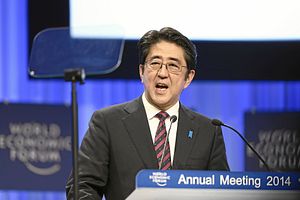Japanese Prime Minister Shinzo Abe did not waste any time after Donald Trump was elected the 45th president of the United States. Abe plans to meet President-elect Trump in New York next week, less than 10 days after the U.S. election.
Why such a rush?
One possible reason is to cover his faux pas: when Abe visited New York in September to attend the United Nations General Assembly, he took time to have one-on-one meeting with Democratic presidential candidate Hillary Clinton, but he did not meet then Republican presidential candidate Trump. Many saw the meeting as an unsubtle sign of who Abe thought would win the election. Given this, maybe Abe (and/or his advisers) felt that being one of the first world leaders to congratulate Trump was not enough; Abe would need to see him in person, before any other world leader does, to make up for it.
Another possible reason for the early meeting is the concern within Japanese government about what the Trump administration’s policy toward Japan might look like. Trump has often referred to Japan in a not-so-positive way, hinting that his government might request Japan pay all the costs if Tokyo wants the U.S. forces in Japan to stay. Trump has also argued that the extended nuclear deterrence the United States provides to Japan and South Korea is too expensive for the U.S. to maintain, triggering speculation that Trump may be encouraging Japan to acquire its own nuclear capability. Most importantly, Trump has frequently spoken about “re-negotiating” trade deals that he deems unfair to the United States, including the Trans-Pacific Partnership (TPP), which would be detrimental to Abe’s economic and trade agenda. So there may be a few areas where Abe wants to seek clarification directly from Trump himself.
Still, the timing of Abe’s meeting with Trump is questionable at best. Deciding when to meet the newly elected president is tricky for foreign leaders. Seeing a U.S. president (or president-elect, in this case) when key government positions relevant to foreign policy are left unfilled can be counterproductive, even starting the relationship off on the wrong foot. One only has to go back to 2001, when George W. Bush became president, for such an example. Kim Dae-jung, then the South Korean president, was so eager to become the first Asian leader to meet the new U.S. president that he visited Washington DC in March 2001, when Bush had not even been in the office for 100 days. None of Bush’s key Asian policy positions has been appointed, let alone confirmed. The summit between the two leaders was hardly a success. The impression Bush took away from this awkward summit meeting with his South Korean counterpart lingered, overshadowing the U.S.-South Korea relationship during his presidency.
President-elect Trump today is even less prepared to meet a foreign leader. The transition process has just begun. None of his top foreign and national security policy appointments are ready to be announced, let alone any positions that will be tasked specifically with managing relations with Asia. There are so many things Trump needs to sort out, including how to properly detach himself from the business empire he has built up to date during his presidency. In other words, he has much to do, and much to prepare, before he starts meeting with foreign leaders, either as a president-elect or the new president. In a time like this, seeking a meeting too early can be counterproductive.
The best case scenario is that, by meeting President-elect Trump early, Abe may be able to begin to build a personal rapport with Trump. After all, Trump has made it known that he likes a strong leader, and he may see the kind of strong leader he likes to deal with in Abe. The worst case, however, is that their first meeting will turn into a conversation in which the president-elect, still unprepared and under-briefed, launches into the type of critical comments on Japan and U.S. engagement in the world (including Asia) he has made on the campaign trail — but this time, he will be speaking directly to Abe.
The first impression carries a heavy weight in determining people’s opinions of others. This is especially true among leaders. One can only hope that Abe’s first meeting with Trump will not end up being a case of “haste makes waste.”
































